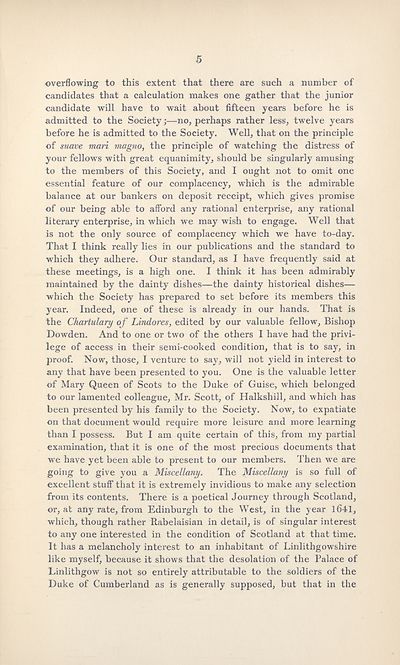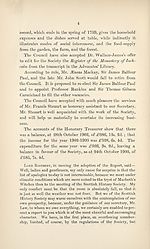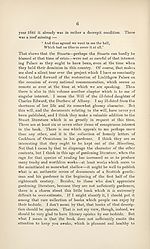Download files
Complete book:
Individual page:
Thumbnail gallery: Grid view | List view

5
overflowing to this extent that there are such a number of
candidates that a calculation makes one gather that the junior
candidate will have to wait about fifteen years before he is
admitted to the Society;—no, perhaps rather less, twelve years
before he is admitted to the Society. Well, that on the principle
of suave mari magno, the principle of watching the distress of
your fellows with great equanimity, should be singularly amusing
to the members of this Society, and I ought not to omit one
essential feature of our complacency, which is the admirable
balance at our bankers on deposit receipt, which gives promise
of our being able to afford any rational enterprise, any rational
literary enterprise, in which we may wish to engage. Well that
is not the only source of complacency which we have to-day.
That I think really lies in our publications and the standard to
which they adhere. Our standard, as I have frequently said at
these meetings, is a high one. I think it has been admirably
maintained by the dainty dishes—the dainty historical dishes—
which the Society has prepared to set before its members this
year. Indeed, one of these is already in our hands. That is
the Chartulary of Lindores, edited by our valuable fellow. Bishop
Dowden. And to one or two of the others I have had the privi¬
lege of access in their semi-cooked condition, that is to say, in
proof. Now, those, I venture to say, will not yield in interest to
any that have been presented to you. One is the valuable letter
of Mary Queen of Scots to the Duke of Guise, which belonged
to our lamented colleague, Mr. Scott, of Halkshill, and which has
been presented by his family to the Society. Now, to expatiate
on that document would require more leisure and more learning
than I possess. But I am quite certain of this, from my partial
examination, that it is one of the most precious documents that
we have yet been able to present to our members. Then we are
going to give you a Miscellany. The Miscellany is so full of
excellent stuff that it is extremely invidious to make any selection
from its contents. There is a poetical Journey through Scotland,
or, at any rate, from Edinburgh to the West, in the year 1641,
which, though rather Rabelaisian in detail, is of singular interest
to any one interested in the condition of Scotland at that time.
It has a melancholy interest to an inhabitant of Linlithgowshire
like myself, because it shows that the desolation of the Palace of
Linlithgow is not so entirely attributable to the soldiers of the
Duke of Cumberland as is generally supposed, but that in the
overflowing to this extent that there are such a number of
candidates that a calculation makes one gather that the junior
candidate will have to wait about fifteen years before he is
admitted to the Society;—no, perhaps rather less, twelve years
before he is admitted to the Society. Well, that on the principle
of suave mari magno, the principle of watching the distress of
your fellows with great equanimity, should be singularly amusing
to the members of this Society, and I ought not to omit one
essential feature of our complacency, which is the admirable
balance at our bankers on deposit receipt, which gives promise
of our being able to afford any rational enterprise, any rational
literary enterprise, in which we may wish to engage. Well that
is not the only source of complacency which we have to-day.
That I think really lies in our publications and the standard to
which they adhere. Our standard, as I have frequently said at
these meetings, is a high one. I think it has been admirably
maintained by the dainty dishes—the dainty historical dishes—
which the Society has prepared to set before its members this
year. Indeed, one of these is already in our hands. That is
the Chartulary of Lindores, edited by our valuable fellow. Bishop
Dowden. And to one or two of the others I have had the privi¬
lege of access in their semi-cooked condition, that is to say, in
proof. Now, those, I venture to say, will not yield in interest to
any that have been presented to you. One is the valuable letter
of Mary Queen of Scots to the Duke of Guise, which belonged
to our lamented colleague, Mr. Scott, of Halkshill, and which has
been presented by his family to the Society. Now, to expatiate
on that document would require more leisure and more learning
than I possess. But I am quite certain of this, from my partial
examination, that it is one of the most precious documents that
we have yet been able to present to our members. Then we are
going to give you a Miscellany. The Miscellany is so full of
excellent stuff that it is extremely invidious to make any selection
from its contents. There is a poetical Journey through Scotland,
or, at any rate, from Edinburgh to the West, in the year 1641,
which, though rather Rabelaisian in detail, is of singular interest
to any one interested in the condition of Scotland at that time.
It has a melancholy interest to an inhabitant of Linlithgowshire
like myself, because it shows that the desolation of the Palace of
Linlithgow is not so entirely attributable to the soldiers of the
Duke of Cumberland as is generally supposed, but that in the
Set display mode to:
![]() Universal Viewer |
Universal Viewer | ![]() Mirador |
Large image | Transcription
Mirador |
Large image | Transcription
Images and transcriptions on this page, including medium image downloads, may be used under the Creative Commons Attribution 4.0 International Licence unless otherwise stated. ![]()
| Scottish History Society volumes > Series 1 > Miscellany of the Scottish History Society (Second volume) > (502) Page 5 |
|---|
| Permanent URL | https://digital.nls.uk/126953012 |
|---|
| Attribution and copyright: |
|
|---|
| Description | Over 180 volumes, published by the Scottish History Society, containing original sources on Scotland's history and people. With a wide range of subjects, the books collectively cover all periods from the 12th to 20th centuries, and reflect changing trends in Scottish history. Sources are accompanied by scholarly interpretation, references and bibliographies. Volumes are usually published annually, and more digitised volumes will be added as they become available. |
|---|


